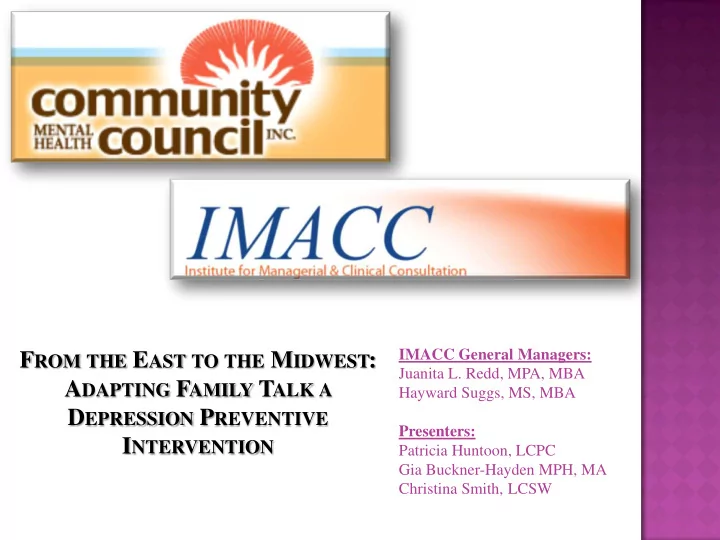

IMACC General Managers: F ROM THE E AST TO THE M IDWEST : Juanita L. Redd, MPA, MBA A DAPTING F AMILY T ALK A Hayward Suggs, MS, MBA D EPRESSION P REVENTIVE Presenters: I NTERVENTION Patricia Huntoon, LCPC Gia Buckner-Hayden MPH, MA Christina Smith, LCSW
“We Save Lives” Wellness Institute Direct Services Research Consultation Services
Human Performance, Training, & Education Organizational Assessment Team Design & Development Strategic Planning and Strategic Staffing Executive and Managerial Coaching Program Development and Evaluation Transitional Management
A description of the Family Talk Depression Preventive Intervention Review of study components and literature Progress report on the Chicago implementation with pilot test agencies Program next steps Presentation of case studies
The embodiment of a 1. family’s hope for the future Central to a family’s 2. narrative and focus
Strongest risk factor for the development of depression in youth, above these other factors Children of depressed parents have four-fold increased risk of developing depression Higher risk for depression in children if parental depression is early-onset, recurrent, and in both parents Most parents of depressed adolescents seeking services themselves have current mood disorders
Evidenced-based prevention model delivered in two methods: 1) Clinician facilitated meetings (6-11); or 2) Parent lectures Assessment of all family members Presentation of psychoeducational material (e.g., mood disorder, child risk, and child resilience) Linkage of psychoeducational material to the family’s life experience Decreasing feelings of guilt and blame in the children Helping the children develop relationships (inside and outside the family) to facilitate independent functioning in school and in activities outside the home
“I can be changed by what happens to me. but I refuse to be reduced by it”. -- Maya Angelou
Providing depression education to the family Supporting the family in building resilience within the parents and children Targeting prevention efforts for your children to reduce the development of depression Helping the family to improve its overall family functioning Supporting the family’s capacity to solve problems together Providing practical ways of approaching new concerns
“A belief that their family matters and are worth the effort”...
Provides practical ways for families to maintain wellness. By focusing on the children, the family works to create new opportunities for growth and change. Helps the family understand that building resilience is intentional and takes practice. Supports parents in re-establishing the adult protective shield. Supports the family in establishing new norms of functioning. Will support the family in minimizing the effects of future trauma. Allows the family to plan for the future.
1. Compatible with a range of theoretical orientations and can be used by a wide range of health care practitioners 2. Strong cognitive orientation 3. Inclusion of a family as a whole 4. Integration of the different experiences of a family, that is, parents and child(ren) 5. Developmental perspective
1979 - 1985: Risk Assessment - Children of Parents with Mood Disorders 1983 - 1987: Resiliency Studies and Intervention Development 1989 - 1991: Pilot Comparison of Public Health Interventions 1991 - 2000: Randomized Trial Comparing Psychoeducational Family Interventions for Depression 1997 - 1999: Family CORE in Dorchester 1998: Narrative Reconstruction 2000: Efficacy to Effectiveness 2009: Chicago Pilot Implementation Multiple Publications
Randomized trial pilot – Dorchester for single parent families of color Development of a program for Latino families Book for families – When a Parent Is Depressed Large scale approaches – collaborations in Finland, Holland, Norway and Costa Rica Family Connections - Program for parental adversity / depression in Head Start and Early Head Start Blackfeet Nation – Head Start Web-based training for Family Talk http://fampod.org/ Chicago Pilot Implementation Multiple Publications
Children’s Hospital of Boston , Dr. William Beardslee, and Boston team Dr. Carl Bell, Community Mental Health Council , IMACC Consultation team Chicago Department of Public Health -Replication of Family Talk in Chicago -Public health prevention strategy for children and families
Training of Core Preventionists – Boston Certification Process - Agency readiness & integration of Family Talk - Family referral, intake, and selection process - Consultation and supervision by Boston team
Family Talk Trainings 6 Trainings conducted for agencies throughout Chicago area - 141 Preventionists trained between May 2010 – September 2011 - Pilot Agencies - 12 agencies recruited and are currently participating in the pilot process, which includes the following: - Completed Agency Readiness Assessment - Bi-weekly supervisions provided by IMACC consultants - Monthly project updates via e-mail - Quarterly administrator conference calls - Post Implementation Evaluation
Train the Trainer for Community Presentations - 5 Agencies completed Train the Trainer - 9 Participants completed the training Community Presentations Delivered - 5 Community presentations completed to date - 68 participants across multiple settings have received Family Talk Community Education presentation
Evaluate Chicago Intervention : Final evaluation of project by pilot agencies Close out conference with Boston partners and Chicago pilot agencies Submit final report to Chicago Department of Public Health to assess for expanded funding opportunities for Chicago agencies
Recommend
More recommend